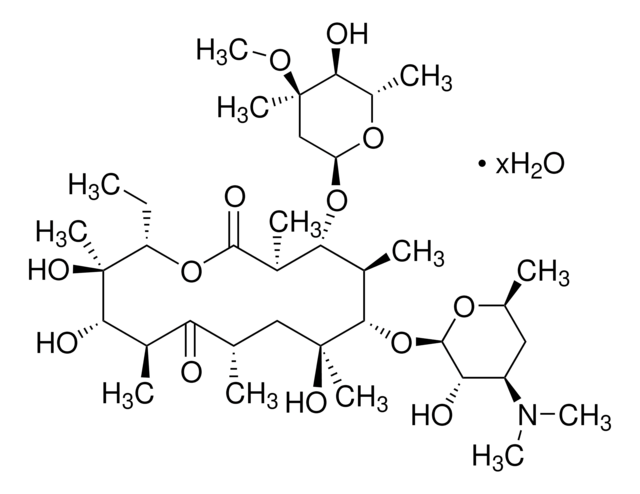E6376
Erythromycin
potency: ≥850 μg per mg
Synonyme(s) :
Erythromycin A
About This Item
Produits recommandés
Source biologique
Streptomyces erythreus
Niveau de qualité
Forme
powder
Puissance
≥850 μg per mg
Couleur
white
Solubilité
ethanol: 50 mg/mL, clear to slightly hazy, colorless to faintly yellow
Spectre d'activité de l'antibiotique
Gram-negative bacteria
Gram-positive bacteria
Mode d’action
protein synthesis | interferes
Chaîne SMILES
CC[C@H]1OC(=O)[C@H](C)[C@@H](O[C@H]2C[C@@](C)(OC)[C@@H](O)[C@H](C)O2)[C@H](C)[C@@H](O[C@@H]3O[C@H](C)C[C@@H]([C@H]3O)N(C)C)[C@](C)(O)C[C@@H](C)C(=O)[C@H](C)[C@@H](O)[C@]1(C)O
InChI
1S/C37H67NO13/c1-14-25-37(10,45)30(41)20(4)27(39)18(2)16-35(8,44)32(51-34-28(40)24(38(11)12)15-19(3)47-34)21(5)29(22(6)33(43)49-25)50-26-17-36(9,46-13)31(42)23(7)48-26/h18-26,28-32,34,40-42,44-45H,14-17H2,1-13H3/t18-,19-,20+,21+,22-,23+,24+,25-,26+,28-,29+,30-,31+,32-,34+,35-,36-,37-/m1/s1
Clé InChI
ULGZDMOVFRHVEP-RWJQBGPGSA-N
Informations sur le gène
human ... ABCB1(5243) , CYP3A4(1576) , MLNR(2862)
mouse ... Abcb1a(18671) , Abcb1b(18669)
Vous recherchez des produits similaires ? Visite Guide de comparaison des produits
Description générale
Application
Erythromycin is an antibiotic produced by growth of certain strains of Streptomyces erythreus. This product is composed largely of erythromycin A with small amounts of erythromycins B and C and is recommended for concentration at 100 mg/L. Concentrations between 50 and 200 mg/L have also proven effective in controlling bacterial growth. Erythromycin has been used as a motilin receptor agonist, to block respiratory glycoconjugate secretion in human airways in vitro, and for selecting plasmid-cured and recombinant lactococcus lactis MG1363 strains.
Actions biochimiques/physiologiques
Antimicrobial Spectrum: This product acts against both gram-negative and gram-positive bacteria.
Attention
Notes préparatoires
Code de la classe de stockage
11 - Combustible Solids
Classe de danger pour l'eau (WGK)
WGK 3
Point d'éclair (°F)
Not applicable
Point d'éclair (°C)
Not applicable
Équipement de protection individuelle
Eyeshields, Gloves, type N95 (US)
Faites votre choix parmi les versions les plus récentes :
Déjà en possession de ce produit ?
Retrouvez la documentation relative aux produits que vous avez récemment achetés dans la Bibliothèque de documents.
Les clients ont également consulté
Articles
Antibiotics targeting bacterial ribosomes disrupt protein synthesis, a key process in bacterial growth inhibition.
Antibiotics targeting bacterial ribosomes disrupt protein synthesis, a key process in bacterial growth inhibition.
Antibiotics targeting bacterial ribosomes disrupt protein synthesis, a key process in bacterial growth inhibition.
Antibiotics targeting bacterial ribosomes disrupt protein synthesis, a key process in bacterial growth inhibition.
Notre équipe de scientifiques dispose d'une expérience dans tous les secteurs de la recherche, notamment en sciences de la vie, science des matériaux, synthèse chimique, chromatographie, analyse et dans de nombreux autres domaines..
Contacter notre Service technique







